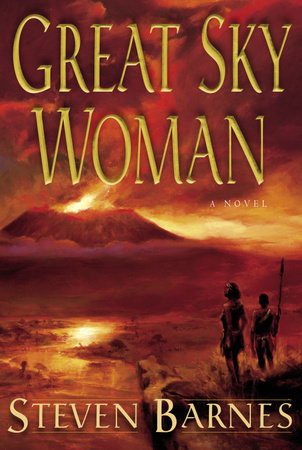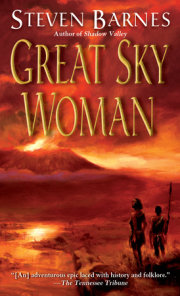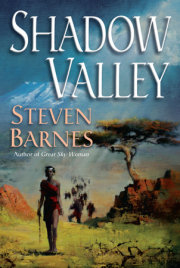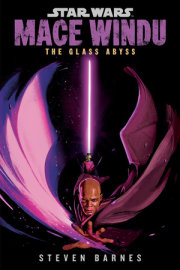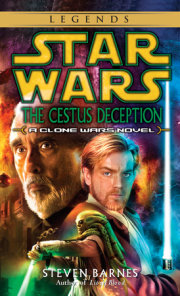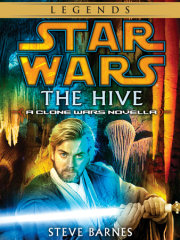Chapter One
Stillshadow was ancient now, what her people called a “woman of dust.” Four tens of warm rains had moistened her deeply weathered face. Daily walking on plains and hills, hot tea brewed from the poison-grub plant’s spiky leaves and milky roots, and the grace of Great Mother Herself kept the old medicine woman’s back straight and her tread light. Stillshadow was thought tall, standing a handsbreadth higher than the average Ibandi woman, the height of a typical male. Her skin was the color of dark clay, her black hair tightly coiled, her wise old eyes black and flecked with gray. Like other medicine women, other dream dancers, she covered her breasts and genitals with beaten and softened deerskin flaps, partially for protection from the cooler air atop Great Earth, but also in recognition that her seventh eye belonged to Father Mountain and His sons the hunt chiefs.
She clicked and clucked to herself, and slipped a wrinkled hand into the speckled brown deerhide pouch dangling at her waist. From it she extracted a fibrous pellet of crushed insects, ground leaves and herbs, bound with fresh moist fungus from sacred caves on Great Earth’s western face, the powerful hallucinogenic mixture medicine women called godweed. The crone tucked it between her gum and lip, savoring the chewy texture with anticipation. Her cheek tingled as the extracts of nettle-berry, thistleroot and poison-grub leaves filtered their way into her blood.
Her eyes rolled back in their sockets, exposing the whites. Stillshadow surrendered to the divine connection, sinking back against the broad flat rock she and the mothers before her had called their sitting stone. From there, she gazed down from Great Earth’s heights to the valley floor, the rock-tumbled, bamboo- and grass-filled plain, familiar slopes she had walked and climbed since childhood. Two days’ walk to the north, filling the horizon, stood Great Sky, the tallest mountain in all the world, in whose misty heights the Creators themselves lived their fierce, jealous, eternal love.
Squatting, eyes tilted to the clouds, Stillshadow hummed a trance song to herself, idly scraping lines and curves in the loose black soil with the tip of her walking stick. Her eyelids slid closed, newborn stars scintillating in the pulsing blackness. Once immersed in this state of waking dream, the old woman’s scrawling intensified. After a time she opened her eyes to examine what she had created. Most days, little met her eyes save an overlapping tangle of meaningless doodles. From time to time her mystical state produced something of unusual symmetry, truth or beauty. Those few drawings she etched again upon her sitting stone, carved into a tree trunk or painted upon one of the countless rock walls and shelves jutting from Great Earth herself.
Four hands of small huts were arranged like mushroom rings on the slope behind her. Constructed of wood and patched with mud, most were lashed firmly together with vines and green branches, but one central hut was sturdier, a wasp’s nest of sticks and clay. Come rainy season, the unfired clay would dissolve, the sticks separate, the roof and walls collapse upon themselves. The drawings sheltered beneath it would fade like last moon’s dreams. This, however, was considered no tragedy. Indeed, this was the way it had always been. Come the dry season Stillshadow would begin anew, as had the grandmothers before her. In hands of pictographs she would recount the previous year’s events, adding memories of the deeper past, as well as inscribing visions from the future. Until, of course, the rains erased those as well.
But that was good, as appropriate as spring’s sky-spanning butterfly swarms, the golden clouds heralding the return of the vast and vital herds: gazelle, giraffe, deer, eland and countless others of Great Mother’s four-legged children in mouthwatering profusion. Ultimately the rains, however harsh, were merely another part of the cycle. They destroyed nothing.
A short, slight girl with a deer’s wide-eyed grace approached from behind her. The child paused a respectful moment, then softly asked: “Mother? What do you see?”
This was Stillshadow’s youngest daughter, Small Raven. Raven had lived just eight rains, but her exquisite shadow-dancing had already earned a place at the Spring Gathering’s central fire. Raven spent too much time twisting her hair into patterns, cared too much for the bits of shells she laced onto her necklaces, and for inventing meaningless little snatches of song she would caw in the voice of her namesake. But the girl had an undeniable talent for medicine as well. If she proved as powerful a dancer as Stillshadow hoped, and she stayed the course, her future held great promise.
“Many things,” Stillshadow murmured. “Not for you. Not yet.”
“When?” Raven asked.
“One day. Or not.” She rose, walked two hands of paces and stooped to enter the central hut. Its entrance was low enough to force entrants to crawl humbly, a reminder of their status before the great mountains. Through strategically placed holes in the roof streamed yellowish light, illuminating the glyphs and grooves scrawled in the dirt below. The symbols represented moon and sun, birth and death, rain and wind. This was the history of the Ibandi, Great Mother’s first and favorite two-legged. The mural was re- created every year, beginning at the first full moon after the butterflies returned, to be completed before the orb melted and was reborn.
Raven followed her mother at a respectful distance, again waiting as Stillshadow squatted, peering at the designs. “How can I help?” The child’s wide eyes sparkled.
Stillshadow raised her palm in a clear message: By remaining silent. She scrawled in the dirt, muttering to herself in singsong. “Wolf’s woman Twilight bore two children. See how the line grows!” She pointed at an extension scratched in the dust a mere hand of days before. “More and more are born. Something new comes. Something new . . .”
“New?” Small Raven asked.
Too late: once again, Stillshadow had vanished into her waking dreams.
“You scare me, Mother,” Raven whispered.
When the crone finally emerged from her trance and regarded Raven, her dark, ancient eyes were webbed with blood, the pupils contracted tightly. The girl shrank back.
“I am sorry,” the medicine woman said, her voice still thickly furred with godweed. “But Great Mother takes me to far places, and where she leads, I must follow.”
Raven nodded, confusion sharpening her narrow little face. “What do you see?”
Stillshadow paused before answering. “For lives beyond counting our people have ringed the mountains. Soon it may be time to go.”
“Go?” Raven asked. “Leave Great Earth? Great Sky? What would we do? Where would we go?”
“I can see it,” Stillshadow said. “But I know not when, or where. The world changes.”
Through narrowed eyes Stillshadow watched the horror dim her daughter’s fire, knew the strength required to control it, and felt great pride. She took her daughter’s hands. So smooth, where hers were rough and wrinkled with age. For a moment she remembered when Night Bird, her mother and mentor, had held her own small hands. How impossibly wise and beautiful and ancient Bird had seemed. How wondrous to know that Raven doubtless saw her the same way. “I hope one day my seat at the spring fire will be yours. But it may not be here, in this place.”
“You hope?” Raven said, young voice plaintive. “You do not know?”
“I do not know,” the old woman confessed.
“Where do we go?” the child asked again.
Raven’s num-fire wavered with confusion, and Stillshadow regretted her inability to assuage it. She shrugged. “I do not know. And I may not live to see it. But I feel one truth: a child will be born. She comes, and in her seven eyes lives our new home. We must search for her.”
Raven peered more closely at Stillshadow’s symbols. Some resembled monkeys, or elephants, or sunrises. Stillshadow suspected that Raven thought some to be mere meaningless scrawls. That would be understandable: Small Raven’s training was far from complete. Stillshadow felt that the eyes of Raven’s face and hands and feet were wider and clearer than those of any child she had ever trained. When at last Raven’s seventh eye opened, she might be the greatest dreamer of all.
Sometimes Stillshadow wondered if those were merely the hopes of an old woman with more sunrises behind than before her. She could not serve her people forever, and hoped it would be one of her fleshly daughters who carried on. Certainly, she had not kept all of her children. Those unsuited to this severe life were raised in the bomas below. One of Raven’s brothers as well as two older sisters had been raised in Water and Wind bomas, the villages to the south and north. But one sister, Blossom, lived the dream, and one brother ran with the hunt chiefs, so the flesh continued.
But was Raven destined to lead the dream dancers? To lead their people in concert with a boy, perhaps already a man, who would one day join the hunt chiefs on Father Mountain?
Stillshadow did not know. In time, Great Mother shared all knowledge. That time was yet to come.
Copyright © 2006 by Steven Barnes. All rights reserved. No part of this excerpt may be reproduced or reprinted without permission in writing from the publisher.

